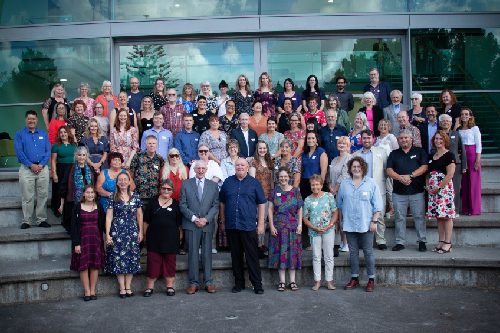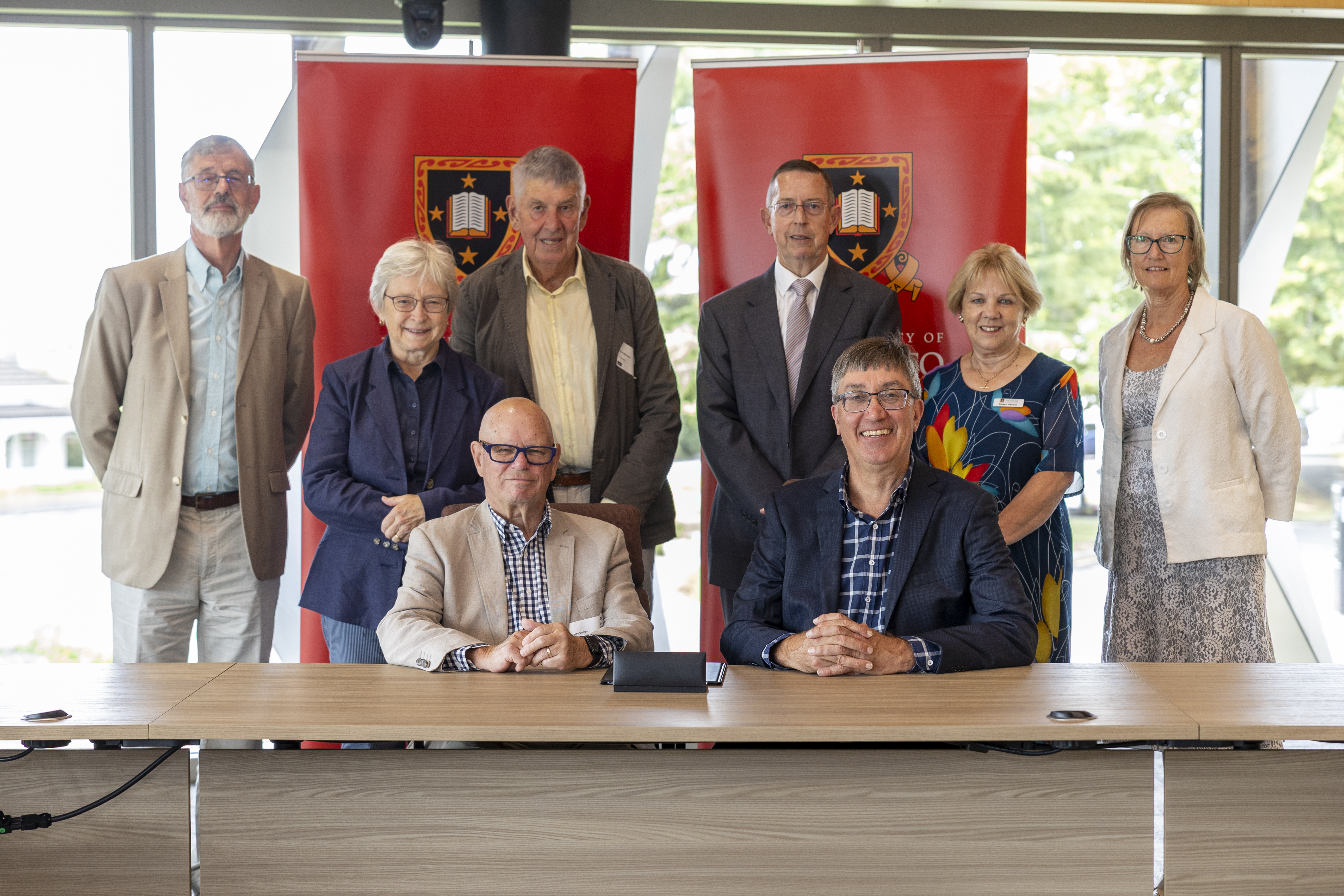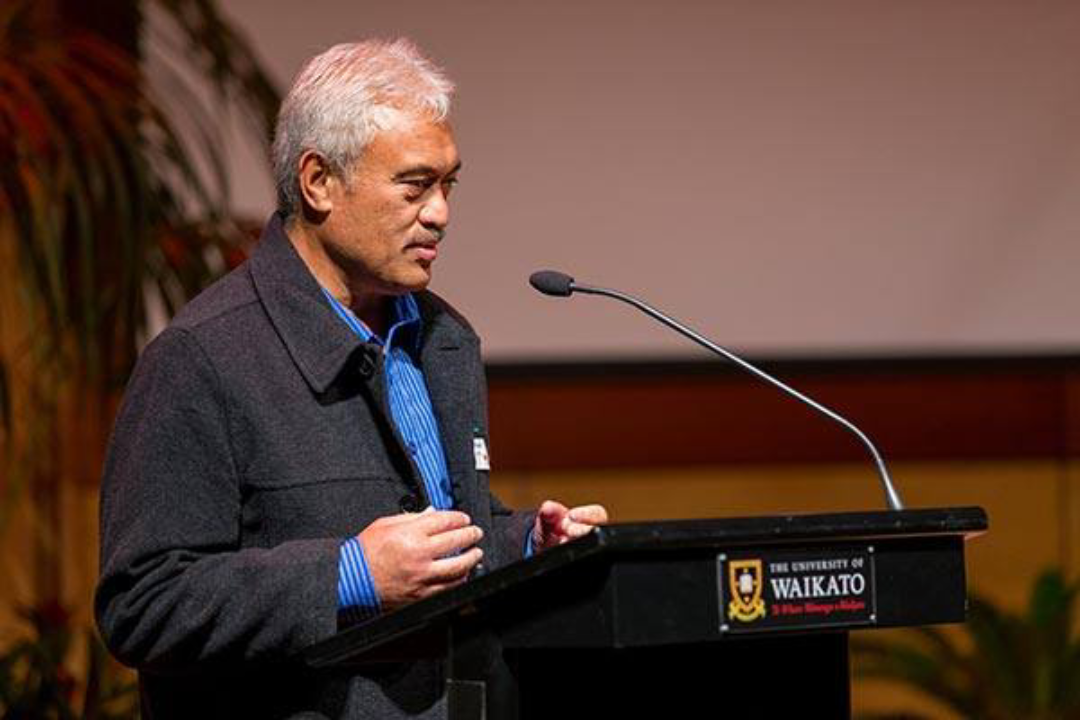More than 85 people gathered to celebrate the University of Waikato’s School of Psychology on Sunday at the Gallagher Academy of Performing Arts in Hamilton.

Around 85 people, including former staff and students, stakeholders and current students, gathered at the Gallagher Academy of Performing Arts for the 50th celebrations.
The event marked 50 years since its postgraduate clinical and applied behaviour analysis psychology programmes began in 1973.
“We had a great turnout,” says Dr Tim Edwards, acting head of the School of Psychology. “There were former staff and students there, as well as community stakeholders, all joining us to reflect on the journey to this significant milestone.”
Waikato was one of the first universities in the North Island to establish a Postgraduate Diploma in Psychology (Clinical) programme, launching in 1973 with six students. Since its inception, a total of 342 people have graduated from the School.
The intensive three-year programme included a two-year master’s degree followed by a one-year full-time supervised clinical placement.
EARLY YEARS
The programme was the brainchild of Dr Barry Parsonson, a senior lecturer in the School of Psychology at the time, with the support of the department chair, Professor James Ritchie.
In the early years, the programme combined clinical psychology and behavioural therapies, with a strong emphasis on applied behaviour analysis (ABA), alongside ethics and practical skills.
“It was important that, when students graduated, to have a basket of skills - a kete - to draw competencies in the practising world,” says Dr Parsonson.
In 2006, a separate ABA programme was developed by Professor Mary Foster and Dr James McEwan, with a particular focus on training psychologists to work in education and disability sectors.
Today, students have the option to apply for the Postgraduate Diploma in Psychology (Clinical) or the Postgraduate Diploma in the Practice of Psychology.
WAIKATO PSYCHOLOGISTS IN DEMAND
The postgraduate psychology programmes at Waikato continue to be popular with both students and employers.
“Over the past five years there has been a huge increase in demand for psychology graduates,” says Dr Carrie Barber, registered clinical psychologist and senior lecturer.
The Waikato clinical programme accepts just 12 people a year from around 60 applicants.
The programme “punches above its weight” nationally, producing graduates who make an important contribution to society, says senior lecturer Dr Armon Tamatea.
Graduates have gone on to leadership roles in a variety of industries including health and mental health, education, corrections and government, behavioural sciences and in private practice working with individuals and communities.
“It’s a profession that saves lives,” says Dr Tamatea. “It has all kinds of flow on benefits, for example, interrupting abuse cycles, whether domestic violence or child abuse. It saves not only future emotional harm but future victims, and costs to services and general burden of costs onto broader communities as well.”
Likewise, the ABA programme’s graduates are changing lives, says Associate Professor Angelika Anderson, who heads the School’s applied behaviour analysis programme.
The PGDipPsych programme accepts up to 10 people a year, with many interns and graduates working in the disability, health and education sector.
“Our graduates typically work with individuals with high needs in residential care facilities in the disability sector, managing severely challenging behaviour in both adults and children. They also work in education, working with children with developmental disabilities and in schools, supporting children with learning difficulties. There is a huge unmet need in this space,” says Dr Anderson.
STRONG RELATIONSHIPS
One of the strengths of the School programme is its applied emphasis - a legacy of its early years - and focus on developing clinicians with practical skills. There is also an emphasis on applied research, from training dogs to sniff out disease to traffic safety, to the community psychology programme.
The School has strong links to organisations such as Te Whatu Ora and Ara Poutama Aotearoa Department of Corrections in the Waikato and Bay of Plenty regions, where many postgraduate students do internships.
The Waikato programme is committed to developing relationships with Māori practitioners and iwi groups. In the past three years, 40 percent of clinical programme graduates have been Māori.
PRIDE IN THE PROGRAMME
The two postgraduate psychology programmes work well in parallel.
“At this institution, there is a very happy coexistence,” says Dr Anderson. “I think looking into the future, we would seek to find ways to benefit even more from mutual interactions and influence of our respective programmes.”
“The longevity of the programme speaks for itself,” says Dr Tamatea. “I’m very proud of being part of a programme that, when you look at the list of past graduates, [some] pretty esteemed people have come through here. Fifty years is something to be proud of; that’s half a century of developing clinicians in the region.”
Adds Dr Edwards: “These programmes are the beating heart of the School of Psychology and connect us to the community in a very tangible way, where our students and alumni positively impact countless lives. It was wonderful to get together to celebrate this milestone together.”






